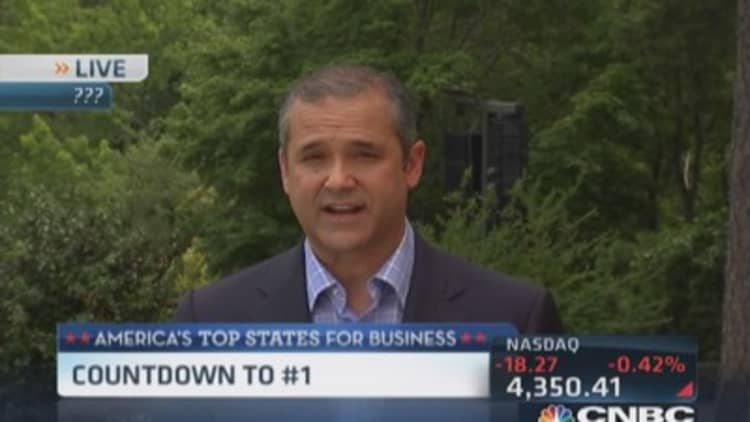It wasn't long ago that the thought of corporations bringing their manufacturing back to the U.S. seemed all but impossible. But that's precisely what's happening, and the trend is predicted to continue through the rest of the decade.
Consider Kent International, one of the largest U.S.-based bicycle manufacturers. The company, with headquarters in Parsippany, New Jersey, has been making its bikes overseas for more than 20 years. But with Chinese labor costs rising over the past several years, the company began to consider whether it made financial sense to bring some of that production back to the U.S. In the fall, Kent's new manufacturing facility will open in Clarendon County, South Carolina. According to the company, it will invest $4.5 million in the plant over the next three years and hire 175 workers capable of turning out roughly 500,000 bikes a year.
American companies have been offshoring their manufacturing for decades as a way to take advantage of low wages in places like China, Vietnam and other parts of Asia. But now a growing number of them, like Kent International, are rethinking that formula and are bringing at least some of their manufacturing back to the U.S.
States such as Alabama, Pennsylvania and Mississippi, to name a few, are getting in on this reshoring movement, as it's called, looking to attract manufacturing back home in the hope of boosting economic development and job growth.
There are a number of reasons for this shift. Wages in China have been growing roughly 15 percent per year over the past decade, while salaries for manufacturing jobs in the U.S. have risen on average just 2.3 percent over the past 10 years, according to the Labor Department. Factor in higher transportation costs, growing quality-control issues connected with goods made in China and cheaper domestic energy costs, and the case for bringing manufacturing back home begins to add up.
Indeed, a recent survey by The Boston Consulting Group (BCG) found that more than half of the CEOs at U.S.-based manufacturing companies with revenues greater than $1 billion are planning to bring production back to the U.S. from China or are actively considering it. The top three factors cited as the drivers of where goods should be made were labor costs, proximity to customers and product quality. In fact, more than 80 percent of the CEOs cited at least one of these reasons as a key factor. Other reasons included access to skilled labor, transportation costs, supply chain lead time and ease of doing business.
What's driving the reshoring trend
Harry Moser is founder and president of the Reshoring Initiative, a Chicago-based firm that works with companies to bring manufacturing jobs back to the U.S. He believes that when companies look at the total cost of ownership (TCO) rather than simply the lower wages in places like China, the case for bringing manufacturing back to the U.S. makes business sense.
"A decade ago, companies were wowed by lower wages in China and ignored all the other costs associated with manufacturing overseas," he said. With rising wages in China as well as more favorable conditions here in the U.S.—including being closer to the customer—companies can no longer make the argument that it's more economical to manufacture overseas. "The case isn't as clear-cut as it was a decade ago," Moser added.
Read MoreState winners and losers in the jobs war
A number of U.S. states are seizing on this trend to redouble their efforts to woo manufacturers to produce in their cities. Alabama announced in 2012 that European aircraft manufacturer Airbus chose Mobile as the site of its first U.S. facility to build commercial airliners. The $600 million project is scheduled to begin production on Airbus' A320 line of single-aisle planes in 2015 and, when fully under way, will generate 1,000 permanent new jobs. With its low taxes and high-quality trade schools, Alabama's manufacturing sector has been growing. In addition to Airbus, Hyundai, Honda and truck manufacturer Navistar are also expanding manufacturing in the state.
Kentucky is the beneficiary of General Electric's decision to reshore. For years GE outsourced the manufacturing of a hybrid water heater to China. But in 2009 the company looked at rising wages and escalating transportation costs and decided to bring production of the water heaters back to the U.S. A $38 million facility in Louisville was opened in 2012, the first new GE factory in the city since 1957. The new plant is part of a $1 billion initiative by GE to bring new appliance lines to the U.S. and create 1,300 new jobs at plants in Louisville, Bloomington, Indiana and Decatur, Alabama, according to the company.

Moser's group is helping other states with their reshoring efforts. In Pennsylvania and Mississippi the Reshoring Initiative is partnering with economic development offices to pinpoint products and parts being imported to the state and to identify the companies bringing them in. Armed with that knowledge, these economic development officials can approach those companies with information about which firms can make the goods locally.
"Often, the pushback we get is that wages are too high domestically," explained Moser. In that case, his group works with the company to determine the total cost of ownership, including the duty, freight, packaging and transportation costs associated with producing the goods overseas. In about 25 percent of the cases, he added, "the company finds out it makes sense to bring the work back to the state."
Read MoreAmerica's top states for business
And while Moser and others believe that the reshoring trend will continue, they do acknowledge challenges exist. "There is a shortage of some types of skilled labor, such as toolmakers and precision machinists, here in the U.S., and that can slow down the implementation of reshoring," Moser said. "That's going to take a change in perception in business and the educational community that manufacturing jobs are not dirty and dangerous but rather that they require a more educated workforce."
Even so, Moser said he is heartened by his firm's research. It shows that new reshoring is balancing out new offshoring at about 40,000 manufacturing jobs per year. "That's the first neutral year of manufacturing jobs losses and gains in about 20 years," he explained.
A zero-sum game might not seem like anything to cheer about, but after decades of losing manufacturing jobs to other countries, it's certainly a step in the right direction.
—By Susan Caminiti, special to CNBC.com





